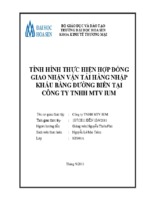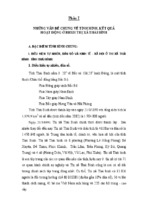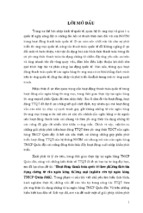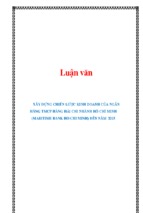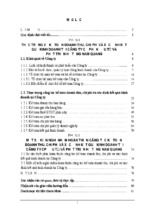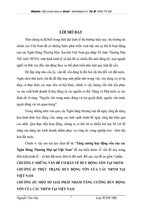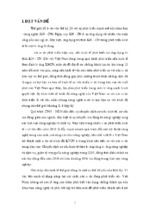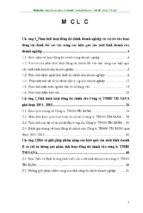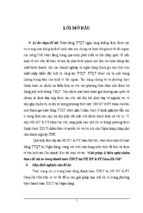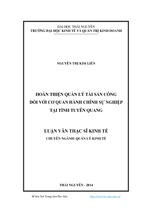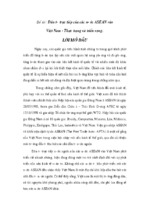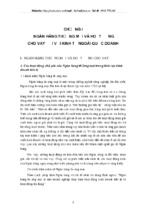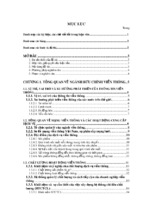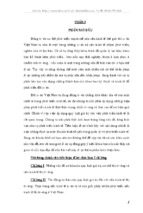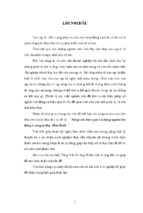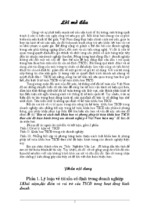BỘ GIÁO DỤC VÀ ĐÀO TẠO
TRƯỜNG ĐẠI HỌC DÂN LẬP HẢI PHÒNG
-------------------------------
ISO 9001:2015
KHÓA LUẬN TỐT NGHIỆP
NGÀNH: NGOẠI NGỮ
Sinh viên
: Phạm Thị Ngọc
Giảng viên hướng dẫn: Th.s Phan Thị Mai Hương
HẢI PHÒNG - 2019
BỘ GIÁO DỤC VÀ ĐÀO TẠO
TRƯỜNG ĐẠI HỌC DÂN LẬP HẢI PHÒNG
-----------------------------------
A STUDY ON SECOND YEAR ENGLISH MAJORS’
PERCEPTION TOWARDS TEACHERS’ ORAL FEEDBACK
IN SPEAKING LESSONS AT HPU
KHÓA LUẬN TỐT NGHIỆP ĐẠI HỌC HỆ CHÍNH QUY
NGÀNH: NGOẠI NGỮ
Sinh viên
: Phạm Thị Ngọc
Giảng viên hướng dẫn: Th.S Phan Thị Mai Hương
HẢI PHÒNG - 2019
BỘ GIÁO DỤC VÀ ĐÀO TẠO
TRƯỜNG ĐẠI HỌC DÂN LẬP HẢI PHÒNG
--------------------------------------
NHIỆM VỤ ĐỀ TÀI TỐT NGHIỆP
Sinh viên: Phạm Thị Ngọc
Mã SV: 1412401181
Lớp: NA1802
Ngành: Ngoại Ngữ
Tên đề tài: A study on second year English majors’ perception towards
teachers’ oral feedback in speaking lessons at HPU
NHIỆM VỤ ĐỀ TÀI
1. Nội dung và các yêu cầu cần giải quyết trong nhiệm vụ đề tài tốt nghiệp
( về lý luận, thực tiễn, các số liệu cần tính toán và các bản vẽ).
……………………………………………………………………………..
……………………………………………………………………………..
……………………………………………………………………………..
……………………………………………………………………………..
……………………………………………………………………………..
……………………………………………………………………………..
……………………………………………………………………………..
……………………………………………………………………………..
2. Các số liệu cần thiết để thiết kế, tính toán.
……………………………………………………………………………..
……………………………………………………………………………..
……………………………………………………………………………..
……………………………………………………………………………..
……………………………………………………………………………..
……………………………………………………………………………..
……………………………………………………………………………..
……………………………………………………………………………..
……………………………………………………………………………..
3. Địa điểm thực tập tốt nghiệp.
……………………………………………………………………………..
……………………………………………………………………………..
……………………………………………………………………………..
CÁN BỘ HƯỚNG DẪN ĐỀ TÀI TỐT NGHIỆP
Người hướng dẫn thứ nhất:
Họ và tên:.............................................................................................
Học hàm, học vị:...................................................................................
Cơ quan công tác:.................................................................................
Nội dung hướng dẫn:............................................................................
Người hướng dẫn thứ hai:
Họ và tên:.............................................................................................
Học hàm, học vị:...................................................................................
Cơ quan công tác:.................................................................................
Nội dung hướng dẫn:............................................................................
Đề tài tốt nghiệp được giao ngày … tháng ….. năm …..
Yêu cầu phải hoàn thành xong trước ngày …. tháng ….. năm ……
Đã nhận nhiệm vụ ĐTTN
Đã giao nhiệm vụ ĐTTN
Sinh viên
Người hướng dẫn
Hải Phòng, ngày ...... tháng........năm 20..
Hiệu trưởng
GS.TS.NGƯT Trần Hữu Nghị
ABSTRACT
This Graduation thesis studies on 2nd year English major students’ perception towards
Teachers’ oral feedback in speaking lessons at Hai Phong Private University. The
thesis is divided into four parts. The first part is the introduction of the study. The
second part presents literature review of feedback and oral feedback in speaking
lessons. The third part shows the results of the research and the final part is the
conclusion and some suggestions from the study. The aim of this thesis is to describe
the 2nd year English major students’ perceptions towards the use of oral feedback
provided by the Teacher in speaking lesson. The methodology in this research is
quantitative methodology with three
data collecting techniques: questionnaire,
interview and class observation. The result of data in this study shows that almost all
of the students have positive attitude while there are only very few number of students
have negative attitude towards the feedback provided by the teacher in speaking
lessons. Regarding to the result, the author give some suggestions for English teachers,
students and the future researchers at the end of paper.
1
ACKNOWLEDGEMENTS
A completed study would not be done without any assistance Hence, I would like to
express my deepest appreciation to all those who provided me the possibility to
complete this thesis.
The greatest thank I address to my advisor Ms. Phan Thi Mai Huong who has
generously given me invaluable assistance and guidance. Besides, I would love to
send my sincere thanks to English Department – Hai Phong Private University,
especially to all the teachers for the lectures supporting this study. Simultaneously, I
also deliver my thanks to all students of K21 – English Department at Hai Phong
Private University, who were willing to help me fulfill the survey questionnaire, attend
my interview for my analysis and supported me throughout my study. Last but not
least, I am grateful to my family and friends who have given me much encouragement
during the time I carry out and accomplish this Graduation thesis.
Hai Phong, August 2019
Student
Ngoc
Pham Thi Ngoc
2
Table of Contents
ABSTRACT ...................................................................................................................1
ACKNOWLEDGEMENTS ..........................................................................................2
CHAPTER 1: INTRODUCTION ...............................................................................7
1.1 Rational for the study: ...............................................................................................7
1.2 Aims of the study.......................................................................................................8
1.3 Research Questions of the study................................................................................8
CHAPTER 2: LITERATURE REVIEW .................................................................10
2.1. Feedback .................................................................................................................10
2.1.1 Definition of feedback ..........................................................................................10
2.1.2 Oral feedback and Written feedback ....................................................................10
2.1.2.1 Oral feedback .....................................................................................................10
2.1.2.2 Written feedback ...............................................................................................11
2.1.3. Reasons for giving oral feedback ........................................................................11
2.2. Feedback in speaking lesson ..................................................................................12
2.2.1 Feedback in Relation with students’ motivation ..................................................12
2.2.2. Positive characteristics of feedback in building students’ motivation ................12
2.2.3. Feedback in Relation with Students' Accuracy and Fluency ..............................13
2.2.4. Encouraging the students to apply the feedback given .......................................14
CHAPTER 3: RESEARCH METHODOLOGY ......................................................16
3.1 Research methodology ............................................................................................16
3.1.1 Context of the research: ........................................................................................16
3.1.2 Instruments of data collection ..............................................................................16
3.1.3 Method of study ...................................................................................................17
3.1.4 Procedure of data collection .................................................................................17
3.1.5. Data Analysis .......................................................................................................17
3.2. Findings and Discussion ........................................................................................18
3.2.1 Students’ perception related to oral feedback, students 'motivation, and students’
self- confidence..............................................................................................................18
3.2.1.1 Students’ perception about oral feedback’s motivation to increase students’
ability in speaking English ............................................................................................18
3
Chart 1: Percentage of students feeling that feedback motivates them to increase their
English speaking ability. ...............................................................................................19
3.2.1.2
Students’ perception about oral feedback’s motivation to increase students’
confidence in speaking English. ....................................................................................19
3.2.1.3 Students’ perception related to the praise given by the Teacher .......................19
3.2.1.4 Students’ perception about the excessive oral feedback and students' inferiority
.......................................................................................................................................20
3.2.3 Oral Feedback in relation with Students’ Accuracy and Fluency .......................23
3.2.4 Encouraging the students to apply the oral feedback given ................................25
CHAPTER 4: CONCLUSION ......................................................................................28
4.1 Conclusion ...............................................................................................................28
4.2 Suggestions from the study .....................................................................................28
4.3 Limitations of the study ...........................................................................................29
References .....................................................................................................................30
APPENDIX 1.1: QUESTIONNAIRE FOR STUDENTS ........................................32
APPENDIX 1.2: INTERVIEW QUESTIONS ..........................................................35
4
LIST OF ABBREVIATION
Et cetera
Vân vân
Hai Phong Private
Đại Học Dân Lập Hải
University
Phòng
Pp.
Page
Trang
E.g.
Exempli gratia
Ví dụ
Etc
HPU
5
List of charts
Chart 1: Percentage of students feeling that feedback motivates them to increase their
English speaking ability.
Chart 2: Percentage of students finding the teacher’s oral feedback increases their
confidence in English speaking.
Chart 3: Students’ perception related to the praise given by the teacher
Chart 4: Students’ perception about the excessive feedback.
Chart 5: Students’ perception that feedback makes them feel inferior
Chart 6: Students’ perception related to the students’ weaknesses, strengths, and
improvement strategy contained in teacher’s oral feedback
Chart 7: Students’ perception related to the focus of the feedback given.
Chart 8: Students’ perception about their awareness, understanding, and application
of feedback
Chart 9: Students’ perception towards teachers’ sensitivity in delivering feedback
6
CHAPTER 1: INTRODUCTION
1.1 Rational for the study:
In the tendency of integration of the global economy, English has become the global
language means for multinational and multicultural communication. With the rapid
development and expansion of informatics technologies, it is the most widely spoken
foreign language in the world. Nowadays, it plays a vital role in many fields in the life
including tourism business, foreign trade, science, technology, education,
entertainment and so on. In Vietnam, English is known as a key language tool to
success in science technology and get in touch on an international level. It is
undeniable that the importance of English has increased day by day in Vietnam. The
number of English speakers has been on the rise for many years. Therefore, there has
been an explosion in the need of teaching and learning English in Vietnam.
Of four English skills, it can be said that Speaking is the skill that a large number of
Vietnamese students meeting difficulties in learning. The fact that there are many
students are very good at Grammar or reading skills; however, they don’t speak
English really well. One of the main reasons of this fact is that they are not confident
when talking in English with others or performing in front of the crowd.
When I was a high school student, I experienced a feeling that some of speaking
teachers’ oral feedback, which was not clear and mainly focus on my weaknesses,
caused me some drawback. At that time, instead of improving my speaking skills, the
provided feedback seemed to lower my motivation. As a result, I rarely put speaking
teacher’s into my consideration, although I did want to improve my speaking skills.
However, everything is totally different when I entered university. My speaking
English Teacher’s oral feedback encouraged me so much. After my performance, she
often pointed out the strong points first, gave me some praise to encourage me , then
she gently mentioned what I wanted to improve. She also guided me how to correct /
improve my mistakes. Surprisingly, I started being interesting in speaking English
again, and following the Teacher’s instruction to practice speaking English. The result
was that my English speaking skills was much improved. My experiences show that
my perception towards speaking teacher’s oral feedback has influenced the way I
respond to feedback.
My own experiences also urged me to read and study on students’ perception towards
teacher’s oral feedback in speaking classes. I found that many authors proved that
students’ perception was crucial because it affected the way students react towards the
feedback provided. In other words, students’ perception is an important part of
learning process because it directly affects to the learning result. According to Cook
7
(1994), perception guides people’s behavior. More broadly, Kreitner (1992) believes
that perception will also lead to the change of attitude, motivation and behavior. From
those two experts, it is clear that students’ perception will both guide the behavior and
change the attitude, motivation, and behavior of the students. Moreover, motivation is
considered as an essential part in students’ perception. Dörnyei (2001) suggests that it
has a very vital role in determining success of failure in any learning situation.
Considering the importance of students’ perception, Lee ( 2008) warns teachers not to
ignore the students ‘ perception because they may risk themselves of continually using
counterproductive strategies if they don’t understand how students feel about and
respond to teacher oral feedback.
My experiences and what I read about students’ perception towards oral Teacher’s
feedback in speaking class lead me to the curiosity how the students at HPU feel when
receiving the speaking Teacher’s oral feedback. I wonder whether they share the same
feelings with me, the feelings caused by how I perceived the way used by my teachers
in giving the feedback and the content of it. This is the main reason why I chose to
wrote my graduation paper with the title : “ A study on second year English majors’
perception towards Teachers’ oral feedback in speaking lessons at HPU”.
1.2 Aims of the study
Since the problems aroused are due to the fact that oral feedback affects to students’
perception, this paper is aimed to:
- Cover background knowledge of feedback, types of feedback and feedback
characteristics in speaking classes
- Investigate the students’ perception towards teachers’ oral feedback in speaking
class.
- Give some suggestions for the teacher and the students to take full advantages of oral
feedback.
1.3 Research Questions of the study
Determining factors related to students’ perception towards Teachers’ oral feedback in
speaking class are used as the framework in this paper in order to elicit students’
perceptions. Those factors are students’ motivation, positive characteristics of
feedback in building students’ motivation, feedback in relation with students’ accuracy
and fluency, and encouraging students to apply the feedback.
There are four research questions of this study: how are the students’ perception
towards teachers’ oral feedback in speaking class in relation with their motivation?;
How are students’ perception towards teachers’ oral feedback in speaking class in
relation with positive characteristics of feedback in building their motivation?; How
8
are students’ perceptions towards teachers’ oral feedback in speaking class in relation
with the students’ encouragement in applying the feedback given?.
1.4 Design of the study
This study consists of four chapters:
Chapter 1: Introduction: includes the rationale to the study, aims of the study and
design of the study.
Chapter 2: Literature Review: This chapter is divided to 2 main parts. The first part
presents definition of feedback, comparison between oral feedback and written
feedback and reasons for giving oral feedback. The second part mentions determining
factors related to students’ perception towards Teachers’ oral feedback in speaking
class as bellows:
1. Feedback in Relation with Students’ Motivation
2. Positive characteristics of feedback in building students’ motivation
3. Feedback in Relation with Students 'Accuracy and Fluency
4. Encouraging the students to apply the feedback given
Chapter 3: Research Methodology: includes 2 main parts. The first part presents the
research methodology including context of the research methodology, instrument of
data collection, method of the study, procedure of data collection and data analysis.
The second part describes findings from the study and discussion from the findings.
Chapter 4: Conclusion: includes conclusion from the findings, suggestions for
Teachers. Students and further research and limitations of the study. At the end of the
study, there are references and the appendixes that include all the documents relating
to the study.
9
CHAPTER 2: LITERATURE REVIEW
2.1. Feedback
2.1.1 Definition of feedback
Feedback is a term that has numerous definitions, and it has been proven relatively
difficult to define precisely. Moreover, feedback can relate to several issues, it can be
used for different purposes. The most popular definition of feedback is Rydal’s (2005).
According to Rydal, Feedback is a method used “ to express one’s view with the aim
of facilitating and/ or promoting more appropriate actions in the future, in relation to a
goal or a vision”. To make it clear, feedback is a comment or a response from a person
towards somebody else’s work to facilitate her to be better in the future. Feedback can
be either positive or negative or a mixture. For example, a manager can give feedback
about how well and how badly his/ her staff is working.
In teaching, Ur ( 2006) has asserted that feedback is the information provided by a
teacher towards a student regarding her performance during teaching - learning
processes. Additionally, Hattie and Timely ( 2007) have stated that feedback “ is a
consequence of performance.” In other words, feedback is information given by an
“ agent” towards “ one’s performance”. In the language classroom, feedback can be
addressed as a response given towards errors or good performances in using the target
language. According to Ithaki and Althobati (2010, p. 198), feedback is an “
immediate response to a learner’s errors.” Therefore, it can be concluded that feedback
commonly give immediately after an error is produced, positive feedback can also be
given immediately after a good performance.
To sum up, feedback is an immediate response towards a learner’s performance during
the teaching – learning process in order to promote better performance in the future.
2.1.2 Oral feedback and Written feedback
There are several types of feedback that are usually used in the language classroom.
Some scholar name them as positive and negative feedback, and others call them
implicit and explicit feedback. In this study, the writer names them as oral feedback
and written feedback – which is the most popular feedback’s classification.
2.1.2.1 Oral feedback
Oral feedback, as its name already states, is given orally and often in interaction with
people. It can be given to an individual, to a group or to the whole class ( Brookhart
2008). According to Clarke, it is the most natural feedback, because it can be given
instantly and frequently. Being given oral feedback, students know what they have
done right and what could be improved right after the performance, not a day or a
week later. There is also a chance for students to ask questions about the feedback they
10
received, or justify or argue their choice. Thus, the issue is still fresh and the students
also feel more motivated to listen to the feedback, because he/she still remembers how
the task and the performance was like. The students have a chance to correct the errors
right after their teacher’s feedback. From that feedback, they can learn the
pronunciation and speaking skills of teacher. Hence, the oral feedback is more suitable
with speaking and pronunciation class.
2.1.2.2 Written feedback
According to Noora Pirhonen (2016), written feedback is an essential part of the
feedback system. It has been used in education alongside oral feedback. With written
feedback, one basically aspires to achieve the same goals as with the oral feedback.
The main target is to help the students and give feedback in a way that succeeds in
developing their skills in the best possible way. However, the students have to wait at
least some days, even some weeks to receive the written feedback. Therefore, the issue
is no longer fresh at that time, and the students don’t feel motivated to receive the
feedback as they does with the oral feedback because they may not remember why
they answered/ wrote or performed like that. Moreover, they don’t have a chance to
correct the errors right after the teacher’s feedback. Deidre (2010) indicates that
teachers always assume that students’ writing is a process, in which they modify their
writing after receiving feedback from the teacher. Additionally, this means that
students should have the time and resources available to do so. The feedback, then,
must be encouraging and respective, making the students develop using their own
ideas and own strengths during the process. The students can learn Teacher’s
grammar, writing skills; then the written feedback is suitable with writing, grammar
and reading class.
2.1.3. Reasons for giving oral feedback
Feedback is used in the process of learning in classroom. It is used when the teacher
correct the errors which are produced by the students ( Asnawi, 2015). When teachers
use oral feedback, it can be positive or negative.
Positive feedback is used to praise students for doing a good job. The teacher give
good comment for what the students do by saying “ very good”, “ excellent” or “ good
job” which motivates the students very much. The suitable feedback also helps
promote a positive self – concept and self- confidence in the students.
Another part of feedback is “ negative feedback” which is used to help students
understand what has to be changed in an utterance. When the students make an error in
learning process, the teacher will correct by comment and help the students by giving
the correct form. In short, negative feedback helps the students to understand where
they are and help them to move to the right direction.
11
2.2. Feedback in speaking lesson
2.2.1 Feedback in Relation with students’ motivation
There is a strong and unavoidable connection between teacher’s oral feedback and
students’ motivation, and some theories are presented in line with this fact.
Some experts believe that feedback builds students’ motivation (Dörnyei , 2001;
Lewis, 2002:4). From motivation point of view, Dörnyei ( 2001) mentions that
feedback increases learners’ satisfaction and learning spirit which he calls as
“gratifying function” of feedback. “Gratifying function” occurs when feedback which
provides praise for the students is due and appropriate. However, according to
Graham, feedback should not offer praise after success in easy task. Paris and Turner (
1994) show that students may interpret success that comes without challenge or risktaking as indication of the lower expectations held by others for their own level of
achievement.
According to Dörnyei ( 2001), positive self- concept and self- confidence in the
students can be promoted by teacher’s feedback. Students’ positive self- concept and
self- confidence arouse when teacher’s comment communicates trust and
encouragement. Rffini ( 1993: 147) shows that when teachers believe in students,
students believe in themselves. From this statement, it can be inferred that when the
students believe that the teachers trust them and they find teacher feedback encourages
them to improves their performance, students will be sure about their ability.
However, feedback may cause several drawbacks in building students’ motivation.
Dörnyei ( 2001) points out that not every type of feedback is equally positive and on
occasion. If the teachers are not careful enough, the feedback might be
counterproductive. Lightbown and Spada (2000) note that feedback that is given
excessively or more than needed is detrimental for student’s development since it only
causes embarrassment, anger, inhibition and feeling of inferiority. In line with
Lightbown and Spada, Ur (1996) points out that excessive feedback may cause
discouragement, depression and decrease in learning interest of students.
2.2.2. Positive characteristics of feedback in building students’ motivation
Several characteristics of feedback in promoting students’ motivation are proposed by
some experts. According to Dörnyei ( 2001), in order to build the motivational
feedback, Teachers should promote “ information feedback” instead of “controlling
feedback”. Unlike controlling feedback which give judgments against external
standards or peer achievements, positive information feedback reflects constructively
on the areas needed to be improved and identifies things for the students to do to
increase the effectiveness of learning.
12
Dörnyei ( 2001) defines that information feedback involves positive, descriptive
feedback regarding students’ strength, achievements, progress, and attitudes. Besides,
he illustrates the characteristics of positive information feedback. Those characteristics
are noting positive or negative trends, identifying areas that were proper and areas that
students should focus on to improve their progress, and providing information on how
successfully the learners were applying various strategies and how their strategy was
improving their performance.
Also, to increase students’ motivation, feedback should be balanced. It means that the
feedback should not only focus on negative or positive area of students’ performance.
Related to this statement, Weaver ( 2006) finds that feedback which does not dwell
only on negative aspect of students’ work is more preferable for them.
Additionally, it also needs to be considered that feedback should be constructive
( Davidson, 2007; Hong Kong Examination and Assessment Authority, 2009). The
constructive actions can be executed by the teacher by pointing out the area the
students need to improve. According to Littlewood (1981) and Lewis (2002), the
teacher’s feedback should show the students about their progress and point out their
errors in order to make them improve. It means that the teacher’s oral feedback should
give notification to the students which areas they have already performed well and
which areas that need improving.
2.2.3. Feedback in Relation with Students' Accuracy and Fluency
Accuracy and fluency are inseparable with the process of learning speaking. Accuracy
deals with grammar, pronunciation and vocabulary ( |Harmer, 2007). Richards ( 2006)
describes the criteria of activities that are focus on accuracy. Those criteria are
reflecting classroom use of language, focusing on the formation of correct examples of
language, practicing small samples of language, not requiring meaningful
communication, and controlling choice of language are some activities that focus on
accuracy.
On the other hand, fluency deals with asking the students to use the language as
fluently as possible ( Harmer, 2007). Richards (2006) also give the criteria of activities
that are focused on fluency such as revealing natural use of language, focusing on
getting communication, involving meaningful use of language, entailing the use of
communication strategies, producing unpredictable language, and seeking to link
language use to context. Both accuracy and fluency need to be mastered by students in
order to successfully speak the target language.
According to Freiermuth (1998), feedback helps to improve learners’ accuracy and
fluency. Feedback notes students’ strong points to strengthen as well as the weak
points to improve in accuracy and fluency they perform. The ways of giving feedback
13
in accuracy- focused activities are different with those of fluency- focused. Rahimi &
Dastijerdi (2012) suggest that if the focus of the lesson is on accuracy, students’ errors
should be corrected immediately. On the other hand, if teacher wants to focus on
fluency, gentle and delayed correction techniques are applied in order not to damage
the flow of the activity or the learners’ confidence. Harmer (2001) also shows that
teacher should not interrupt students to point out a grammatical, lexical or a
pronunciation error when students are doing communicative activities, or they are
involving themselves in fluency because it can stop the communication.
It is concluded that the teacher has to decide whether the focus of the speaking lesson
is on accuracy or on fluency at the beginning of the learning process. After that, the
teacher has to make sure that students also know the focus of the lesson/ activity in
order that the feedback given by the teacher will be accepted without any
misunderstanding. If the teacher’s feedback does not address the focus clearly, the
students will be confused and disappointed because the feedback is out of their
expectation.
2.2.4. Encouraging the students to apply the feedback given
One of the objectives of giving feedback is for students to apply it so that their
performances will be improved. Lewis (2002) states that feedback can encourage
students not only to study but also use language to the best of their ability by following
the teacher’s suggestions. However, some students sometimes tend to disregard the
feedback instead of apply it.
To avoid students’ reluctance to apply the feedback, several aspects in giving feedback
to the learners need to be considered by the teacher.
Firstly, feedback should be understandable by making it clear. One of the feedback
functions is to provide important information to the students. The clarity of the
feedback is necessary to deliver this information. Unless the feedback is clear, the
students will meet difficulties in understanding it. At that time, the ignorance toward
the teacher’s feedback has big chance to happen, no matter how important the content
of the feedback is. There are many experts note the importance of feedback’s clarity.
According to Weaver (2006), students want feedback which is not too general or too
vague. It means that feedback should be clear and specific. Moreover, Konold (2004)
states that clear and understandable feedback will result in helping students become “
effective and efficient learner” . If the students receive the clear enough corrections or
comments, The students will thoroughly understand the feedback, they will thoroughly
understand and successfully apply the feedback without wasting time and energy.
Secondly, students have to be explained that the feedback is given to them to
accommodate their learning. Hargreaves (2011) shows that teacher’s feedback is
14
considered to be effective when the students realize that the feedback is intended to
help their learning. Some students may not realize the importance of teacher’s oral
feedback because the teacher do not clearly states the purpose of feedback which
sometimes are in the forms of criticism and revealing weaknesses. Harmer also adds
that it is the teacher’s responsibility to make students aware the importance of
feedback in the learning process. Therefore, the teacher must find the best and
appropriate way in making the students realize that about the role of feedback in their
learning progress.
Lastly, Harmer (2007) also emphasizes that the sensitiveness should be considered by
the teacher in delivering feedback. It means that the teachers have to consider the way
to give feedback and correction. In other words, the teachers have to judge the moment
and the place to give feedback.
15
- Xem thêm -

